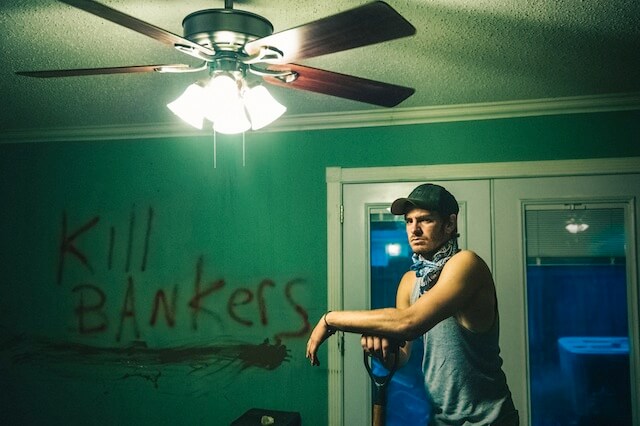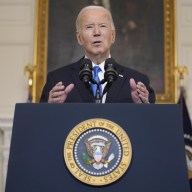’99 Homes’ Rick Carver, the devilish house flipper played by Michael Shannon in “99 Homes,” speaks of the real estate market in Biblical terms. He describes life after the economic catastrophe as another Noah’s Arc, only one where access to the boat comes by screwing over everyone else rather than being divinely chosen. Once an honest broker, he’s found great riches in a market quick to foreclose on homes and turn them over to those with no compunction about profiting off of others’ destruction. It’s a bleak worldview, and one “99 Homes” mostly shares, albeit in a more horrified way. Rick is the villain and our semi-hero is Nash (Andrew Garfield), a man Rick helped boot from his home who then, through circumstances and intense desperation, wound up his latest right-hand man, doing unto others what was done to him. “99 Homes” is the latest from Ramin Bahrani, the social realist of “Man Push Cart,” “Chop Shop” and “At Any Price.” He’s acutely in tune with how the working class is manipulated to act against their own self-interest. In his latest he gets how the system thrives on the screwed-over reinventing themselves as the ones doing the screwing — how we’re so trained for winning that when we lose we seek to take revenge by becoming winners and creating more losers. Nash is introduced fighting helplessly in court to keep his home, and then standing there as he’s ejected from it, given two minutes to grab important belongings while the rest of his wares were dragged out onto the lawn. He doesn’t enjoy doing the same to others, but it seems to give him some empowerment, as well as much-needed dough. Plus Rick has a way of talking about becoming numb to people’s misery in a way that makes it all oddly seductive. RELATED: “Stonewall” fails to give the gay rights watershed the stirring film it deserves Bahrani is also, perhaps inevitably, and perhaps rightly, a little close to being full-on humorless, though his film plays as blackest comedy anyway. “99 Homes”’ view of America is one pared down to an apocalyptic wasteland, filled with empty homes owned by wealthy sharks. The only people employed seem to be the blue collar types Rick hires, who take revenge on the once thriving middle class for chump change. Even the winners are deeply unhappy. Shannon is as sleazy as you might expect, but occasionally Bahrani and fellow screenwriter Amir Naderi give him moments of…not humanity, exactly, but of reflection. He reminisces about the father screwed over by insurance companies, which thus hardened him to get a job that requires him to wear a concealed weapon 24/7. He pretends he’s not annoyed he has to change his number every time enough of his incensed victims have found out what it is. “99 Homes” shows the thrill the sensitive and sometimes actorly-anguished Nash gets from playing the bad guy, but without turning into Scorsese knockoff broad strokes. It shows it plainly, in the form of Nash simply doing his job. He reclaims the sense of purpose and agency he, in another economic climate, may have once had, or at least one he always dreamed of having. Bahrani understands the perhaps irrational, even absurd, compulsion Nash and his mom (Laura Dern, sadly underused after a killer first scene) have towards the house they lost — the sense of losing one’s roots and especially, in this era, of feeling like an intruder when occupying a new house, which was almost certainly someone else’s before the banks got to them. Bahrani presents this plainly and clinically and frankly, though he can’t bear to end this on a bum note. The way he closes it threatens to turn melodramatic and screenwriterly, cashing in on a minor character (played by Tim Guinee) the film had clumsily planted earlier and ending on a final image so on-the-nose it’s depressing in a different way than what preceded it. It seems sincere but impossible to buy, trying to be optimistic about a situation it had convincingly portrayed as f—ed. Then again, it also doesn’t want to buy into Rick’s starkly pessimistic worldview. Not only is Bahrani not wrong about modern America, and the way the impoverished are swayed by charismatic monsters — Rick is Trump, only slightly more prone to self-awareness — he knows how to make didacticism thrilling to watch.
Director: Ramin Bahrani
Stars: Andrew Garfield, Michael Shannon
Rating: R
4 (out of 5) Globes
’99 Homes’ offers an apocalyptic look at the house flipping industry

Broad Green Pictures
Follow Matt Prigge on Twitter @mattprigge


















